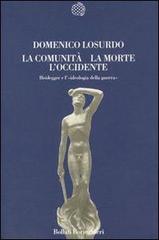What do you think?
Rate this book


252 pages, Paperback
First published January 1, 1991
When we say we are anti-fascist, it doesn’t mean we are only against the specific forms of fascism that developed in Italy and Germany in the mid-twentieth century, but that we are against all forms of fascism—an ideology of war and violence to benefit the community of the privileged off the subjugation and genocide of the out-groups. Fascism adapts to the specific conditions of a time, and it is happy to put on disguises to best appeal to the needs of a nation. That means we cannot be so reductive as to divide philosophers into camps of “Nazi” or “not Nazi” (or “fascist” or “not fascist”), but must understand and recognize those schools of thought that give birth to fascism, or otherwise nurture it and give it cover.
To do so, we must correctly understand the political currents of these proto-fascist philosophies at the time they were written. Philosophy fails particularly spectacularly at this task with Heidegger, a philosopher still widely upheld and read today, as Losurdo lays out:
The debate regarding Heidegger and his relationship with Nazism is still unsettled, and it encompasses several unique aspects. Usually, the historian of philosophy tries to single out the interlocutors and the concrete targets of a certain position, and then tries to reconstruct the real historical framework, even for propositions that have the ambition of being valid sub specie acternitatis. He does this not for the sake of historicist reductionism; on the contrary, his starting point is the awareness that even the excess of one theory with respect to its time cannot be grasped and evaluated without a preliminary attempt at historical clarification. In the case of this debate, however, many interpreters of Heidegger seem dominated by the opposite preoccupation: that of relegating all of his texts, even those in which the political dimension is explicit and declared, to a rarefied, politically aseptic sphere. In this way Heidegger, who not only in his letters and occasional speeches, but also in his theoretical writings, tirelessly comments upon the events of his time, is subjected to a purifying process that is supposed to cleanse him of any worldly contamination.
Losurdo places Heidegger in his historical context again, connecting his philosophical work with his political commentary, and comparing him with both his colleagues that clearly denounced the Nazis (Jaspers, Adorno, Horkheimer, Husserl, etc) and those whose philosophy is much more broadly accepted as aligned with Nazi ideology than Heidegger’s (Schmitt, Spengler, Junger). Losurdo traces themes of community and belonging, historicity, epistemology, identity, modernity and war through the philosophical developments between the start of the war in 1914 through the end of the war in 1945.
One of the difficulties with understanding fascism is that within their political movements, at any given time and over the course of time, different strands of philosophies become expressed. For example, the Nazis upheld a bucolic ideal, but then facing the pressures of war, had to elevate mechanization and production, its antithesis. Heidegger’s relationship with fascism is sometimes excused by pointing to these different currents. His denunciation of the Nazis for giving into mechanization and modernity is hardly a damning blow against fascist ideology. It is not particularly exonerating to criticize certain Nazi ideologues for being too liberal: “The works that are being peddled about nowadays as the philosophy of National Socialism but have nothing whatever to do with the inner truth and greatness of this movement (namely the encounter between global technology and modern man) — have all been written by men fishing in the troubled waters of ‘values’ and ‘totalities’,” (1935) nor is his rejection of specifically biological racism much consolation given his strong antisemitism. His philosophy elevated the transformational aspects of war and volkische community throughout the war, and he shows little self-criticism for his relationship with the Nazi movement after the war.
Losurdo’s argument here hits similar beats as his masterpiece on Nietzsche, however where that work demolishes Nietzsche as a possible pillar from which to build progressive politics, this blow to Heidegger landed as less fatal. This might be partly due to the length; at only one fifth the page count, Losurdo doesn’t have the space to prevent a full intellectual development of Heidegger. Are there parts of Heidegger that can be salvaged, developed towards some other end? It seems unlikely, but Heideggerians might follow their lodestar in doing a poor job of self-critique.